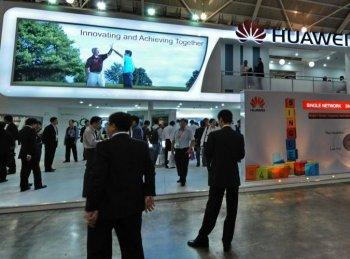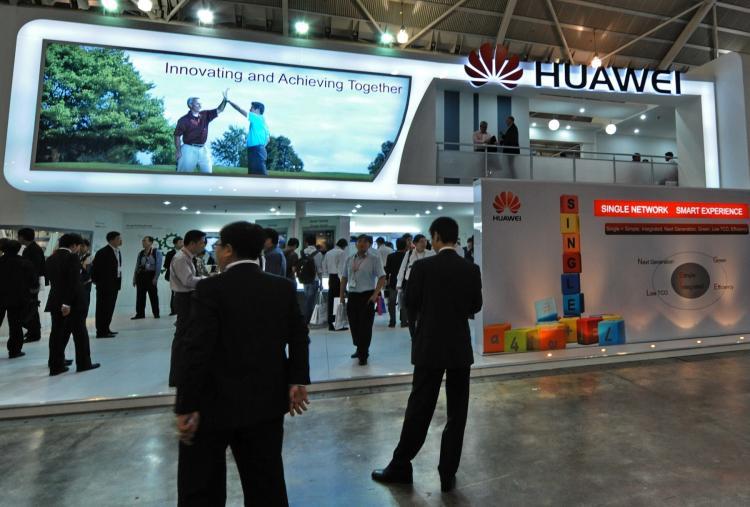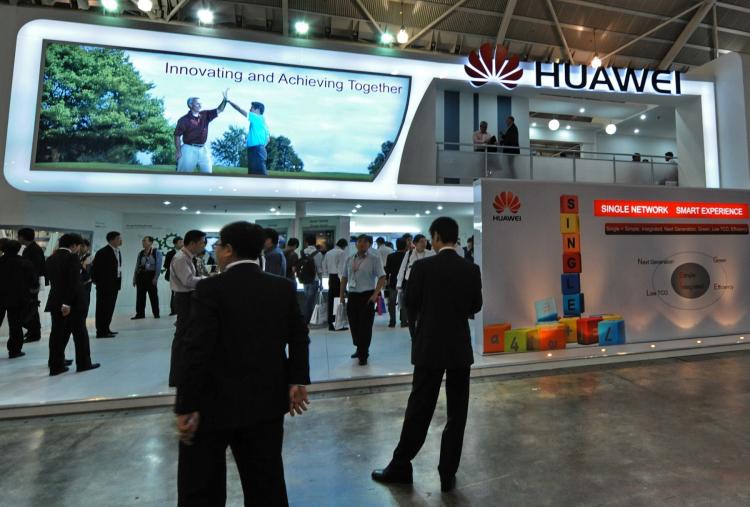Huawei, the Chinese tech giant, is tired of being blocked from the U.S. telecommunications market. For more than a decade it has been dogged by security concerns over links to the Chinese Communist Party (CCP) and Chinese military. In a recent open letter, it says that these accusations are vague and unfair, and that in fact, Huawei has no such ties.
But not according to analysts. “It’s perfectly understandable from a public relations-flak point of view,” says James Mulvenon, vice president of the Intelligence Division of Defense Group Inc., “but that doesn’t make it true.” Mr. Mulvenon has researched Huawei for over a decade.
Richard Fisher, an expert on China’s military modernization who wrote a book on the subject in 2008, was blunter, “This is flat out BS. You can quote that.”
Huawei has long coveted the U.S. Telecommunications market, the most lucrative in the world. Attempts to sell its wares in the United States have repeatedly met with staunch resistance from Congress and the intelligence community. Its most recent response has been a sophisticated PR campaign.
The open letter of Feb. 25 asks the U.S. government to conduct a formal investigation of the company. The letter explicitly denies that Huawei has ties with the Chinese military, and says that it receives no more financial support than is normal from the Chinese state. Huawei, fundamentally, “is a normal commercial institution and nothing more.”
Mr. Fisher says it is more complex than that. “No company in China exists beyond the authority of the Chinese Communist Party and as a consequence beyond the authority of the PLA or beyond the authority of China’s multiple security and intelligence organizations,” he said in a telephone interview.
Huawei Shenzhen Technology Company was founded in 1988 by Ren Zhengfei, the former director of the People’s Liberation Army (PLA) General Staff Department’s Information Engineering Academy. He was responsible for telecom research for the PLA before going into business.
His company got its start laying down the fiber optic network, which became the basis for the computerization of China in the 1990s, Fisher says. This was a job closely connected to the needs of the PLA and particularly its “first mission,” which is to keep the CCP in power.
A widely quoted 2007 Rand Corporation report says, “Huawei maintains deep ties with the Chinese military, which serves a multifaceted role as an important customer, as well as Huawei’s political patron and research and development partner.”
After struggling in the Chinese market, Huawei’s winning ticket came in the early 1990s as it convinced county-level Post and Telecommunications offices to buy their products by giving them a dividend in the company. Global expansion followed in 2003.
Huawei is now a nearly $30 billion a year company. It is held up by the Chinese state as a model to emulate, a “red chip” company, and has been encouraged by the Party in massive overseas expansion—its wares, for example, are bundled with CCP construction projects in African countries. Its owner says that he wishes to eclipse Western companies in the near future.
The open letter is the sixth attempt by the company to break into the U.S. market, according to Mr. Mulvenon.
It runs in parallel to the company’s attempt to rebrand its equipment and import it. Huawei has been buying up small companies in Canada, keeping those companies brands on the equipment, but using Huawei technology. “If you actually open up the equipment, as I have, and look at the [electronic] boards, the boards are Huawei boards. That’s another layer of Trojan Horse,” Mr. Mulvenon says.
In its open letter Huawei says that it operates like any other private corporation, and that it is financed through capital from shareholders and “normal commercial loans.” But this does not accurately represent the situation, according to experts.
As the largest telecommunications equipment manufacturer in China, Huawei is one of the few “national champions” in the Chinese business world. “Being a national champion is freaking awesome,” Mr. Mulveon says.
National champions enjoy a range of privileges in the Chinese system, and state banks open up their coffers for unlimited lines of credit to them.
About a decade ago China Development Bank gave Huawei a line of credit of 10 billion, when Huawei’s income was only 15 billion. “That’s astonishing,” Mulvenon says. Such loans are given at low to zero interest, are never called in, and Huawei only has to play the national champion role. “It’s not really a loan, it’s basically free money.” Being backed by a line of credit that is two-thirds of your revenue stream encourages a company to take major risks, Mulvenon says.
But lines of credit are only one of a whole range of benefits. Others includes tax-free land, foreign assistance, subsidized R&D using money from the 863 Program—the high-level project that seeks development of advanced technologies for the purpose of rendering China independent of financial obligations for foreign technologies—and other benefits.
National champions often have new facilities in the dynamic coastal areas, a high-tech workforce, and they get the pick of the crop of graduates from China’s best universities.
While Huawei is a couple of notches removed from the state giants whose entire management roster is decided by Party apparatchiks, “being a national champion means that the Beijing authority sees the company as part of the China brand,” Mr. Mulvenon says.
Next: Comrade Ren
At the center of the controversy, but always in the shadows, is Ren Zhengfei, the founder.
The Epoch Times analyzed over a dozen speeches and articles by Ren, including ones published in the internal magazine Huawei People. The picture that emerges shows that Mr. Ren is a committed adherent to communist rule in China.
While in the military Mr. Ren was “a model for learning from Mao,” Mao’s stratagems of war communism helped form Mr. Ren’s understanding of Huawei’s corporate culture.
One article enthuses: “He has deep understanding of Mao’s theory in military strategy, methods for dealing with the general public, conflict resolution, dialectical materialism, and others areas. He applied those theories and uses them as the foundation of his corporate management strategy.”
Mr. Ren regularly commends the rule of the Party in his remarks. Mr. Ren has said, “Only the CCP can make China develop steadily,” and “Employees of Huawei always love the country, love the people, and love the Party as our corporate culture.”
Huawei also has active Communist Party cells inside the company. Party cells are a form of social control exercised across government, military, and industry in China. Major organizations have Party branches, according to Mr. Fisher. The existence of a Party branch inside Huawei can be seen as both a display of ideological commitment to the Party’s rule by Mr. Ren, and an increase in the Party’s level of control over Huawei, Mr. Fisher said.
Mr. Fisher says that to prove it is independent from the Party and state, and could not be a proxy for Chinese intelligence or military activities, Huawei would have to explicitly detail the entire history of its relationship with the CCP.
“It would have to, as well, detail and identify all of the Party members within its leadership. And it would have to detail the history of its Party cell. It would have to detail all of the work that it has done for the Chinese military for Chinese intelligence organizations, and detail its current relationship,” Mr. Fisher said.
The Epoch Times asked Huawei to clarify its record and state its current sales volume and R&D cooperation, but they did not respond to phone messages and e-mails.
The question over Huawei is not that it is a front company for the PLA, or that the CCP has told it to implant technology in America for later use as a SIGINT, or signals intelligence platform, but what would happen if the CCP wanted to make use of that technology.
“If the Chinese authorities came and said, ‘We saw that you just won x or y contract, and we would like to use your network access for our purposes,’ there is no way that Huawei could say ‘no’,” Mr. Mulvenon says. Huawei employees themselves have said that, Mr. Mulvenon says.
“Given the way China is structured, given the way that the whole system is structured, there’s no way they could say ‘no.’”
But not according to analysts. “It’s perfectly understandable from a public relations-flak point of view,” says James Mulvenon, vice president of the Intelligence Division of Defense Group Inc., “but that doesn’t make it true.” Mr. Mulvenon has researched Huawei for over a decade.
Richard Fisher, an expert on China’s military modernization who wrote a book on the subject in 2008, was blunter, “This is flat out BS. You can quote that.”
Huawei has long coveted the U.S. Telecommunications market, the most lucrative in the world. Attempts to sell its wares in the United States have repeatedly met with staunch resistance from Congress and the intelligence community. Its most recent response has been a sophisticated PR campaign.
The open letter of Feb. 25 asks the U.S. government to conduct a formal investigation of the company. The letter explicitly denies that Huawei has ties with the Chinese military, and says that it receives no more financial support than is normal from the Chinese state. Huawei, fundamentally, “is a normal commercial institution and nothing more.”
Mr. Fisher says it is more complex than that. “No company in China exists beyond the authority of the Chinese Communist Party and as a consequence beyond the authority of the PLA or beyond the authority of China’s multiple security and intelligence organizations,” he said in a telephone interview.
Huawei Shenzhen Technology Company was founded in 1988 by Ren Zhengfei, the former director of the People’s Liberation Army (PLA) General Staff Department’s Information Engineering Academy. He was responsible for telecom research for the PLA before going into business.
His company got its start laying down the fiber optic network, which became the basis for the computerization of China in the 1990s, Fisher says. This was a job closely connected to the needs of the PLA and particularly its “first mission,” which is to keep the CCP in power.
A widely quoted 2007 Rand Corporation report says, “Huawei maintains deep ties with the Chinese military, which serves a multifaceted role as an important customer, as well as Huawei’s political patron and research and development partner.”
After struggling in the Chinese market, Huawei’s winning ticket came in the early 1990s as it convinced county-level Post and Telecommunications offices to buy their products by giving them a dividend in the company. Global expansion followed in 2003.
Huawei is now a nearly $30 billion a year company. It is held up by the Chinese state as a model to emulate, a “red chip” company, and has been encouraged by the Party in massive overseas expansion—its wares, for example, are bundled with CCP construction projects in African countries. Its owner says that he wishes to eclipse Western companies in the near future.
The open letter is the sixth attempt by the company to break into the U.S. market, according to Mr. Mulvenon.
It runs in parallel to the company’s attempt to rebrand its equipment and import it. Huawei has been buying up small companies in Canada, keeping those companies brands on the equipment, but using Huawei technology. “If you actually open up the equipment, as I have, and look at the [electronic] boards, the boards are Huawei boards. That’s another layer of Trojan Horse,” Mr. Mulvenon says.
‘National Champion’
In its open letter Huawei says that it operates like any other private corporation, and that it is financed through capital from shareholders and “normal commercial loans.” But this does not accurately represent the situation, according to experts.
As the largest telecommunications equipment manufacturer in China, Huawei is one of the few “national champions” in the Chinese business world. “Being a national champion is freaking awesome,” Mr. Mulveon says.
National champions enjoy a range of privileges in the Chinese system, and state banks open up their coffers for unlimited lines of credit to them.
About a decade ago China Development Bank gave Huawei a line of credit of 10 billion, when Huawei’s income was only 15 billion. “That’s astonishing,” Mulvenon says. Such loans are given at low to zero interest, are never called in, and Huawei only has to play the national champion role. “It’s not really a loan, it’s basically free money.” Being backed by a line of credit that is two-thirds of your revenue stream encourages a company to take major risks, Mulvenon says.
But lines of credit are only one of a whole range of benefits. Others includes tax-free land, foreign assistance, subsidized R&D using money from the 863 Program—the high-level project that seeks development of advanced technologies for the purpose of rendering China independent of financial obligations for foreign technologies—and other benefits.
National champions often have new facilities in the dynamic coastal areas, a high-tech workforce, and they get the pick of the crop of graduates from China’s best universities.
While Huawei is a couple of notches removed from the state giants whose entire management roster is decided by Party apparatchiks, “being a national champion means that the Beijing authority sees the company as part of the China brand,” Mr. Mulvenon says.
Next: Comrade Ren
Comrade Ren
At the center of the controversy, but always in the shadows, is Ren Zhengfei, the founder.
The Epoch Times analyzed over a dozen speeches and articles by Ren, including ones published in the internal magazine Huawei People. The picture that emerges shows that Mr. Ren is a committed adherent to communist rule in China.
While in the military Mr. Ren was “a model for learning from Mao,” Mao’s stratagems of war communism helped form Mr. Ren’s understanding of Huawei’s corporate culture.
One article enthuses: “He has deep understanding of Mao’s theory in military strategy, methods for dealing with the general public, conflict resolution, dialectical materialism, and others areas. He applied those theories and uses them as the foundation of his corporate management strategy.”
Mr. Ren regularly commends the rule of the Party in his remarks. Mr. Ren has said, “Only the CCP can make China develop steadily,” and “Employees of Huawei always love the country, love the people, and love the Party as our corporate culture.”
Huawei also has active Communist Party cells inside the company. Party cells are a form of social control exercised across government, military, and industry in China. Major organizations have Party branches, according to Mr. Fisher. The existence of a Party branch inside Huawei can be seen as both a display of ideological commitment to the Party’s rule by Mr. Ren, and an increase in the Party’s level of control over Huawei, Mr. Fisher said.
Mr. Fisher says that to prove it is independent from the Party and state, and could not be a proxy for Chinese intelligence or military activities, Huawei would have to explicitly detail the entire history of its relationship with the CCP.
“It would have to, as well, detail and identify all of the Party members within its leadership. And it would have to detail the history of its Party cell. It would have to detail all of the work that it has done for the Chinese military for Chinese intelligence organizations, and detail its current relationship,” Mr. Fisher said.
The Epoch Times asked Huawei to clarify its record and state its current sales volume and R&D cooperation, but they did not respond to phone messages and e-mails.
The question over Huawei is not that it is a front company for the PLA, or that the CCP has told it to implant technology in America for later use as a SIGINT, or signals intelligence platform, but what would happen if the CCP wanted to make use of that technology.
“If the Chinese authorities came and said, ‘We saw that you just won x or y contract, and we would like to use your network access for our purposes,’ there is no way that Huawei could say ‘no’,” Mr. Mulvenon says. Huawei employees themselves have said that, Mr. Mulvenon says.
“Given the way China is structured, given the way that the whole system is structured, there’s no way they could say ‘no.’”







